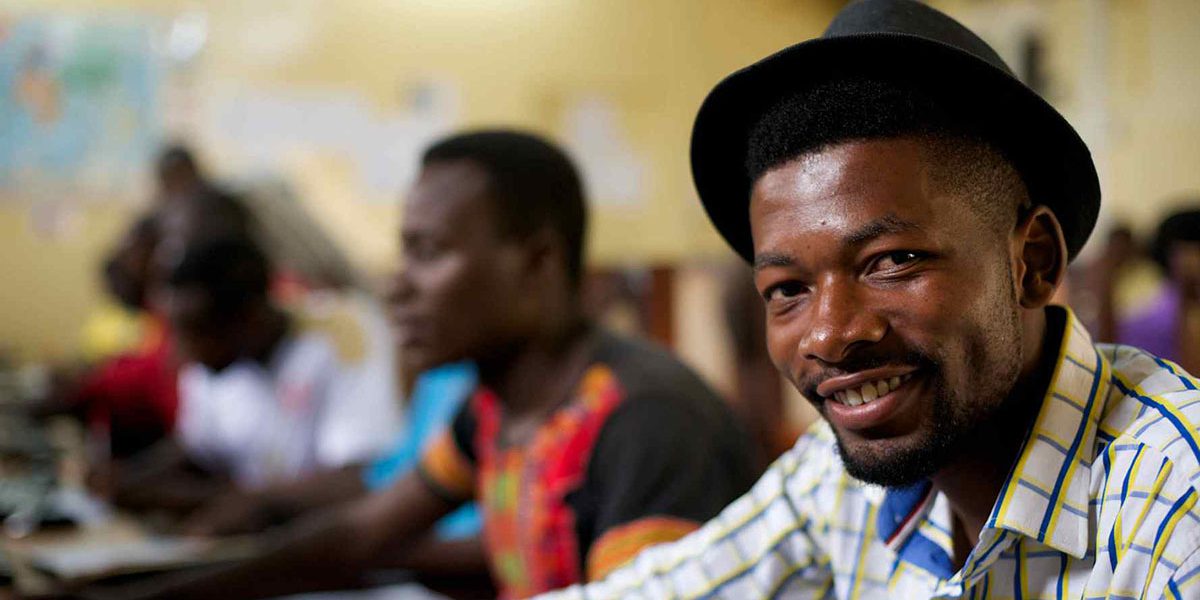
“Albert, you can do great things, not only for yourself, not only for your family, but for the whole world, for your country. So you need to work hard. You don’t need to be afraid of the situation you are facing, you need to go further.” That is what my mom and sister told me. They taught me education is very important, but life had different plans for me. My dreams got interrupted.
My name is Albert, and I am 24 years old. In 2012, I fled Goma in eastern Democratic Republic of Congo with my brother Charles to my small house where I now live in Dzaleka camp, Malawi. Refugees from all different parts of Africa come here escaping wars, poverty, persecution.
Today I am a refugee, but my life was very different before.
I was born in a good family with brothers and sisters and parents that taught me to be a good man. In Goma, I went to university to study economics and management. We had fertile land, rich with minerals, which I was planning to use to start my own companies, to become an entrepreneur and create jobs for people in my community.
While attending university, I also volunteered for an organization dealing with human rights. I was selected to carry out investigations on the human rights violations in the Goma area. We sent all the information gathered to a central bureau and a report was published in November 2012, where after the UN and other organizations asked the government to bring the perpetrators of these abuses to justice.
After that, the persecution against human rights activists and journalists started. One night, armed people broke in our house, shooting to kill. I was able to run away together with my brother Charles, but three bullets hit my other brother and he died.
So we left. We went to Giseny, just across the Rwandan border, where a priest helped us to reach the capital Kigali. But even there it wasn’t safe. So we went to Tanzania, and from there, we finally reached this camp in Malawi. The trip took us 11 days. I left Goma without shoes, and it was only through the help of good people that we could reach safety. Not having proper documents, we had to hide inside trucks, underneath the goods they were transporting.
When we arrived, I understood my life had completely changed. I felt guilty for what I did. Had I not told the truth about the abuses, my brother would be alive; my family would be together; I would be with them, rather than not knowing where they are. In fact, even they had to flee. I haven’t heard from them since. The only thing I have of my mother is her picture. I found a man to replicate that photo in a drawing, which is on the wall of my small place in Dzaleka refugee camp.
People around the world do not understand what we have to go through, what it means to be confined, without freedom, without jobs, without a future. They see us only as refugees. Something must be done to change this. We are human beings. We have rights and hopes. Fortunately, I could bring my knowledge with me, and I always remembered my parents’ words, so I never gave up my will to learn. Here, I learned that it does not matter how much you have or don’t have. You must find ways to survive and look forward. You can always use the resources you have and make the best of them.
In Dzaleka, the chance to study at the Jesuit Refugee Service program called Jesuit Common: Higher Education on the Margins (JRS-JC:HEM) – an online tertiary education program – was my big opportunity. Through the JC:HEM diploma program, I worked to improve my skills and my values. I developed my critical-thinking and communication skills. I then applied those skills by founding an intercultural center called Salama Africa together with other refugees, based on the needs that people have here. It is now becoming a big organization known nationally and even beyond.
The art we make at the center has an impact; it helps us to earn an income. It helps others to unlock their potential. We are making a difference and that’s why I think education is important, especially to the people who are living at the margins. But education alone is not enough. I think people must also learn to respect and help one another. My brother and I experienced life’s greatest hardships. We know what it means to have problems. That is why we adopted two boys that were abandoned by their parents. The younger one lived in comes from an abusive family and also suffers from severe health problems. We are proud and happy we can help him. They have become our younger brothers and now, finally, we feel like a family again.



